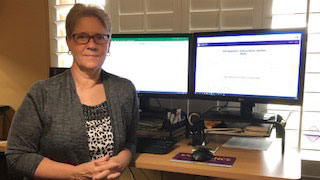
Denita Landsaw, BSCSM, RRT, RRT-NPS, AE-C, spent seven years working as a supply sergeant in the U.S. Army, but when she left the service, she knew she wanted to do something in health care. Respiratory care sounded like a good choice, and after graduating with her RT degree in 2006 she went to work for Children’s Medical Center in Dallas, TX.

“I decided that respiratory care would be a great fit for me because I enjoy being on the front lines of patient care and making an immediate impact,” she said. During her 14-year tenure at Children’s she’s done that and more. In addition to serving as a bedside therapist in acute care, an educator in the asthma program, and a CPR instructor, she headed up the facility’s home medical equipment department for several years.
But when CMS cuts to home care reimbursement led the hospital to close its home health agency in 2019, Landsaw found a new opportunity — and it is one that has allowed her to marry her previous experience as a supply sergeant in the Army with her health care career.
Complimentary skills
“I was contacted by our senior VP of supply chain regarding a position she had available as a value analysis manager,” explained Landsaw. “Having started my first job in the military working for one of the largest supply chains in the nation, combined with my clinical background as a respiratory therapist, I decided that the two sides complimented each other very well.”
The role gave her the opportunity to make an impact on the care of children in a new and different way.
“The Value Analysis Management Team at Children’s Health is a multidisciplinary team comprised of a director of strategic sourcing and value analysis, two registered nurses, a registered radiologic technologist, a registered respiratory therapist, and a value analysis specialist,” she explains. “Each manager on the team works with a designated Value Analysis Committee consisting of subject matter experts and key stakeholders charged with vetting and approving both clinical and non-clinical products and supplies.”
Their primary focus is always on achieving the best outcomes, and they encourage both clinical and non-clinical staff to provide input on what they need to get their jobs done. They ask them to identify the outcomes they expect to achieve as well so that they can bring the right manufacturers to the table to meet their objectives.
Landsaw and the three other value analysis managers on the team drive departmental and organization efforts to enhance those clinical outcomes, each of them working within their assigned portfolio of products and service lines. The goal is to find the optimal balance between quality, service, product availability, and value for the organization and the patients they all serve.
“Whenever a need or issue arises, it is our job to ask for and gather as much detail as possible,” she said. “Next, we need to be able to clearly share that information with our subject matter experts, key stakeholders, executives, providers, and manufacturers, and then finally to advocate for the solution that yields the best patient outcome.”
A good match
Landsaw believes the value analysis manager position is a good match for any RT with strong analytical and problem-solving skills who can combine those abilities with their clinical experience to parse out the best products and services for a given situation.
“If your passion is supporting better patient outcomes through best practice and being able to have a direct impact on a much broader scale, then this is a great job to have,” she said. “To be successful as a value analysis manager you must be able to work with multidisciplinary groups, be flexible to change, and most importantly possess a ‘servant’ leadership mindset.”





